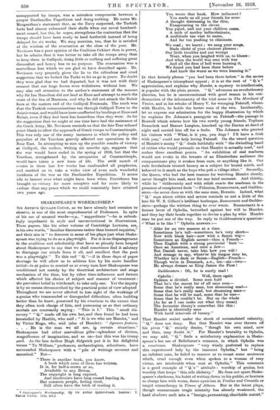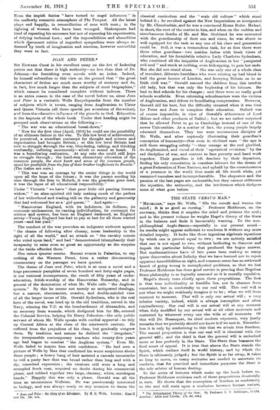SHAKESPEARE'S WORKMANSHIP.•
SIR ARTHUR QUILLER-0017CH, as we have already had occasion to observe, is one of the most unprofessorial of Professors. In spite of his use of unusual words—e.g., " suppeditate "—he is refresh- ingly unpedantic in style and unconventional in illustrations. These papers, like his other volume of Cambridge Lectures, are, in his own words, " familiar discourses rather than learned inquiries," and their aim is " to discover in some of his plays just what Shake- speare was trying to do as a playwright. For it is no disparagement to the erudition and scholarship that have so piously been heaped about Shakespeare to say that we shall sometimes find it salutary to disengage our minds from it all, and recollect that the poet was a playwright." To this end " Q."—if in these days of paper shortage he will allow us to address him by his more familiar initial—is at pains to remind us at every turn how Shakespeare was conditioned not merely by the theatrical architecture and stage mechanism of the time, but by other time-influences and factors which affected his choice of subject and manner of treatment : the prevalent belief in witchcraft, to take only one. Yet the inquiry is by no means circumscribed by the practical point of view adopted. Throughout we are never allowed to lose sight of the workings cf a genius who transcended or disregarded difficulties, often building better than he knew, possessed by his creations to the extent that they often took charge of him, and possessing us so that ordinary mortals are constantly saying : " This is I." This " small dis- covery " " Q." made off his own bat, and then found he had been forestalled by Hazlitt, who said : " It is we who are Hamlet," and by Victor Hugo, who, said (also of Hamlet): " Agneece fratrem. . . . He is the man we all are, iv certain situations." Shakespeare had other marvellous gifts---splendour of diction, magnificence of imagination, and so on—but this was his trump card. As the late Arthur Hugh Sidgwick put it in his delightful verses " To William," professors, archaeologists, schoolmen, have surrounded Shakespeare with a " pile of writings reverent and canonical." But-
" There is another book, you know, A book which none of them has written.
It is, for half-a-crown or so, Available to any Briton. The copyright is long expired, And modernists have long ceased heeding it, But common people, feeling tired, Still often have the trick of reading it.
• ShaArapeares Worktleamkip, By Sir Arthur Qui:ler-Conch. London : T. 1+181: er Unwin. 1158. net.)
You wrote that book. How indiscreet You made us all your friends for ever- A thought distressing to the elite, Exasperating to the clever.
You piped, and out your children came, A mob of motley indiscriminate, A multitude too vast to name, And far too pushing to eliminate.
We read ; we learnt ; we sang your songs, Made cliché of your choicest phrases : Our little troubles and our wrongs Went, when you laughed with us, to blazes : And when the world was rent with war And all the fires of hell were burning it, We found you had been there before And knew the worst as we were learning it."
In that homely phrase "you had been there before " is the secret of Shakespeare's triumphant appeal ; it is at the root of " Q.'s " appreciation, and explains why Hamlet, 41 mystery to intellectuals, is popular with the plait' person. " Q." advances no revolutionary theories, but he is unconventional with good reason in his con- demnation of the inhumanity of the trial scene in The Merchant of Venice, and in his rebuke of Henry V. for wronging Falstaff, whom, with Ha zl tt, he holds the better man of the two. Incidentally, let us express our admiration for the happy illustration by which he explains Dr. Johnson's panegyric on Falstaff—the passage in Boswell which relates how his two rowdy young friends, Topham Beauclerk and Bennet Langton, knocked up the Doctor at dead of night and carried him off for a frolic. The Johnson who greeted his visitors with " What, is it you, you dogs ? I'll have a frisk with you," could not help loving Falstaff. On the vexed question of Hamlet's sanity " Q." deals faithfully with " the dwindling band of critics who would persuade us that Hamlet is actually mad," and makes three excellent points. " An exhibition of real madness would not evoke in the breasts of an Elizabethan audience the compassionate pity it evokes from ours, or anything like it. Our rude forefathers treated lunacy as a subject for brutal mirth, and behaved to it much as the boys who pelt a village idiot." Secondly, the Queen, who had the best reasons for watching Hamlet closely, never thought him mad, save for one brief moment. And thirdly, while he " deliberately and with relish enacts the madman in the presence of complacent fools "—Polonius, Rosencrantz, and Guilden- stern—he never does so with the sane man, Horatio. Indeed, what " Q." says about critics and actors reminds us not a little of the late Sir W. S. Gilbert's brilliant burlesque, Rosencranta and Guilden- stern—perhaps the wittiest thing he ever wrote. Rosencrantz is a former lover of Ophelia, betrothed against her will to Hamlet, and they lay their heads together to devise a plan by whin Hamlet may be put out of the way. In reply to Guildenstern'e question: 0 What is he like ? " Ophelia answers :-
" Alike for no two seasons at a time.
Sometimes he's tall—sometimes he's very short— Now with black hair—now with a flaxen wig— Sometimes an English aocent--then a French— Then English with a strong provincial burr '- Once an American, and once a Jew— But Danish never, take him how you will And strange to say, whate'er his tongue may be, Whether he's dark or flaxen—English—French- Though we're in Denmark, A.D., ten—six—two- He always dresses as King James the First !
Guildenstern : Oh, he is surely mad Ophelia : Well, there again Opinion is divided. Some men hold
That he's the sanest far of all sane men— Some that he's really sane, but shamming mad— Some that he's really mad, but shamming sane— Some that he will be mad, some that he wae- Some that he couldn't be. But on the whole (As far as I can make out what they mean) The favourite theory's somewhat like this : Hamlet is idiotically sane
With lucid intervals of lunacy."
That Hamlet reeled under the shock of accumulated calamity,
Q." does not deny. But that Hamlet was ever thrown off his pivot " Q." stoutly denies, " though his own mind, now and then, may doubt it." For Hamlet's brutality to Ophelia, we may add, " Q." finds a satisfactory explanation in Shake- speare's lax use of Belleforeat's romance, in which Ophelia was a courtesan. Shakespeare " very wisely preferred to replace this experienced lady by the innocent Ophelia," but " being an indolent man, he failed to remove or to recast some sentences which, cruel enough even when spoken to a woman of easy virtue, are intolerable when oast at Ophelia." This comment is a good example of " Q.'s " attitude : worship of genius, but worship that keeps "this side idolatry." He does not spare Shake- speare's slackness, his habit of writing down to his public, or hesitate to charge him with worse, fierce cynicism in Troilus and Cressida or turgid misanthropy in Tinton of Athena. But in the latest plays, though oonsummate tragic intensity has already weakened, the hard shadows melt into a " benign, permeating, charitable sunset." Even the impish fairies " have turned to angel influences " in the mellowly romantic atmosphere of The Tempest. All the latest plays end happily, in reoonciliation of man with man ; in the righting of women who have been wronged. Shakespeare bad tired of repeating his successes but not of repeating his experiments, of defying technical bars ; and the impossibilities and absurdities which disconcert critics of imperfect sympathies were always re- deemed eby truth of imagination and emotion, however untruthful they were to fact.



































 Previous page
Previous page